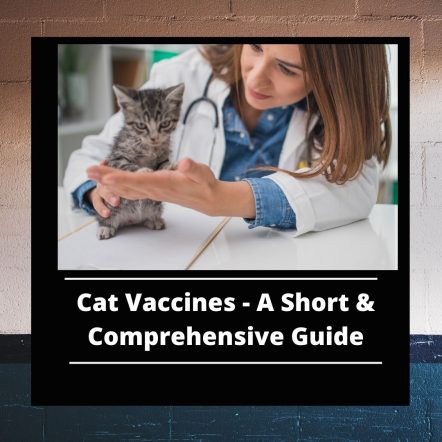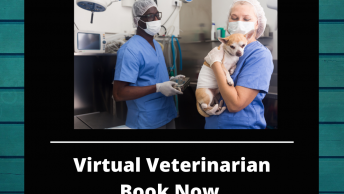Cat Vaccines – A Short & Comprehensive Guide By Cristina Vulpe. Also the creator of the My Feline Buddy Website.
Cat vaccines can be essential as they can prevent potentially deadly diseases. Some can even be transmitted to people (such as rabies). However, not all cat vaccines are created equal, and they have their share of benefits and risks.
To find out as much as possible about all of them, check out the guide below!
Table of Contents
Core vaccines
While it would be ideal for you to vaccinate your cat against all of the conditions for which vaccines exist. The truth is that not all people can afford that luxury. For that reason, veterinarians across the world recommend a number of very important vaccines and mention the rest. But note that the latter can be optional.
Core vaccines are those that can protect your feline friend against diseases. Such as Feline panleukopenia, Feline herpesvirus, and feline calicivirus, and rabies.
Statistically, the chance of your cat catching rabies (even if he or she goes outdoors on a regular basis) is very low. However, if your cat ends up biting or scratching a person, showing them your pet’s records will put that individual’s mind at ease. (and potentially prevent some legal problems for you).
Feline panleukopenia is a very severe gastrointestinal disease that can somewhat be compared to Parvovirus in dogs. Cats that get the virus don’t survive for long, especially if they become infected when they are kittens.
Feline herpesvirus and feline calicivirus are two pathogen strains that are typically included in the same vaccine. They are both respiratory diseases that can cause severe symptoms, especially in younger cats. Some examples of clinical signs caused by these conditions are feline stomatitis, eye and nasal discharge, sneezing, and conjunctivitis.
Non-core vaccines
Non-core vaccines are optional, but that doesn’t mean that your cat doesn’t have a risk of catching these diseases. These vaccines can protect an animal against the Feline leukemia virus, Bordetella bronchiseptica (a bacteria from the same family that the canine kennel cough pathogen belongs to), Feline immunodeficiency virus, and Chlamydophila felis.
All of these are very contagious diseases. If you care for several cats and they are all unvaccinated, they can all become infected if one of them catches any of these conditions.
Types of vaccines for cats
Not all vaccines are the same. Some can contain a part of the infectious pathogen, but others can contain the live pathogen (in a weakened form). There’s also the option of vaccinating your cat with a product that contains completely inactivated pathogens.
Since some cat guardians are under the impression that vaccinating their pets can lead to them developing the disease. We’d like to put their minds at ease by stating that vaccines are thoroughly tested before they end up on the market.
If you still have any doubt about vaccinating your cat for this reason. Ask your veterinarian to use an inactivated vaccine instead of a modified live one.
When do you have to vaccinate your cat?
Kittens should ideally be vaccinated between the ages of 6 to 8 weeks, with a booster given when they get to 10 to 12 weeks of age. Usually, the second dose is required 2 to 3 weeks after the first one, regardless of the pet’s age.
So, if you’ve never vaccinated your cat and he or she is now older than 2-3 months of age, you’ll still have to take your pet to the vet clinic for two consecutive shots.
How often should you vaccinate your cat?
Booster vaccinations are recommended every year. The truth is that cats develop an immunity to these diseases that can sometimes last for two years. For example, almost all rabies vaccines last for two years, therefore these do not have to be included in the yearly vaccination plan.
On the other hand, if you are the owner of an outdoor cat, you should make a goal out of taking him or her to the vet clinic for vaccinations and check-ups every year.
Outdoor cats are more exposed to viral infections compared to indoor ones. They also have a higher likelihood of getting parasites and bacterial infections for which vaccines might not even currently exist.
Can vaccines cause problems?
All vaccines have some side effects. Some of the most common ones, which show up in animals and humans alike, are fever, loss of appetite, and fatigue over the course of 24 to 48 hours following the vaccination.
There is, however, another, more serious risk, and it consists of injection-site fibrosarcoma. This is a rare form of soft tissue sarcoma (cancer) that can affect a low number of cats.
On the whole, vaccines have a lot more benefits than risks.
Do vaccines guarantee that my cat isn’t going to get sick?
Unfortunately, a clear answer to this question does not exist. There are many factors that can affect the protection that your cat gets after a vaccine. They range from whether your pet was stressed when the procedure was done, to the specific type of virus strain that might have infected your cat.
An example of a vaccine that can’t fully protect a cat against disease and has about a 50% success rate is the FIP vaccine. (Feline infectious peritonitis). Scientists have been working on developing an efficient vaccine for this disease for many years. Because there are so many strains that they still haven’t managed to come up with a perfect version.
However, it’s universally acknowledged that getting your cat vaccinated can at least provide him/her with partial immunity against your disease. Therefore the symptoms that your pet will show if he/she gets infected are not going to be as severe.
Final Thoughts on Cat Vaccines Comprehensive Guide
Vaccines are essential if you want to make sure that your feline friend enjoys a happy and healthy life. Vaccines are important not just for keeping your particular cat’s health in check, but also for reducing the incidence of some diseases. (such as rabies, which can be transmitted to people, and whose incidence has been drastically reduced thanks to pet vaccinations).
Although vaccines can cause side effects, their benefits clearly outweigh them. Ask your vet about what the ideal vaccination plan for your cat looks like.
About the Author of Cat Vaccines – A Short & Comprehensive Guide

Cristina Vulpe got her veterinary degree in 2011 and her Ph.D. in canine oncology in 2015. She’s the person behind My Feline Buddy, a blog about cats where most of the articles are geared toward educating pet parents on preventing diseases in cats. When she’s not writing, you can find her reading a good book with her own feline friend in her lap.
Thank you Cristina Vulpe From The Pet Frenzy Community
We couldn’t be more thrilled to have published the post on Cat Vaccines! Thank you for clarifying which ones are important and which ones we can do without! We encourage our viewers to share the post with others. However, don’t forget to check out more of Cristina’s informative posts on her website like Distemper in cats. Or follow her Facebook page called “My Feline Buddy“.










This is such an informative post! I don’t have a cat, but I do have a bunny. Learning the importance of vaccines is super important and it’s great that your advice is written in a way that’s so easy to understand.
Thank you Yanitza for the kind words, we are glad you enjoyed the post and found it very easy to understand. I agree She did a great job on the article 🙂
Brilliant info – we have a number of strays that we help here, so the info you’re sharing is very helpful. thank you.
Thank you Karletta, I am so glad you enjoyed the post-Cristina Vulpe wrote for us! You can find more great posts about cat health and care at her website “My Feline Buddy Website”
I’ve never had a pet cat but for those who do, you have certainly comprehensively answered all questions and worries about vaccinations!